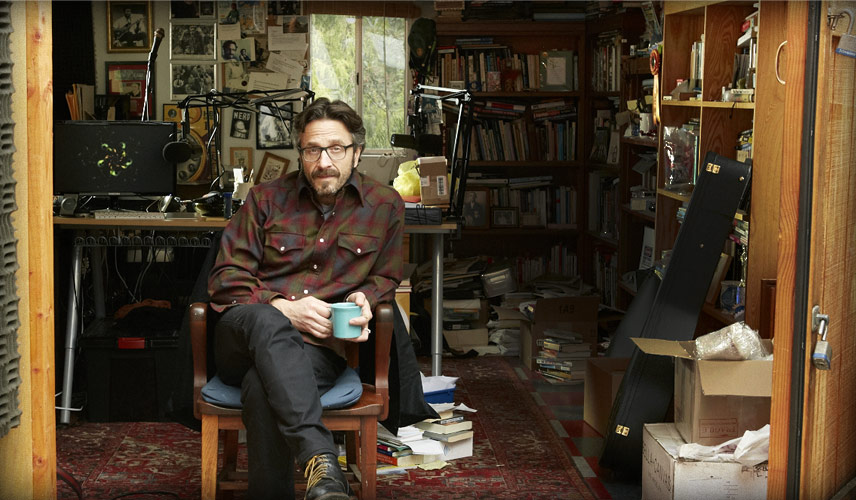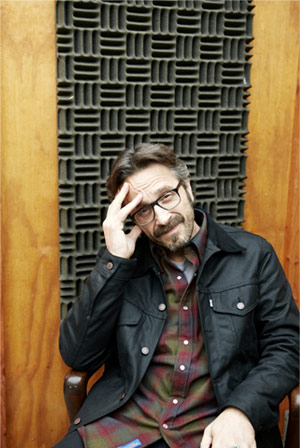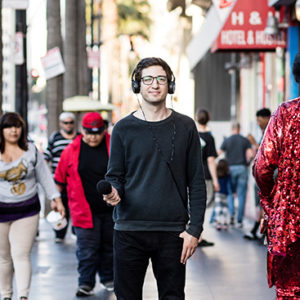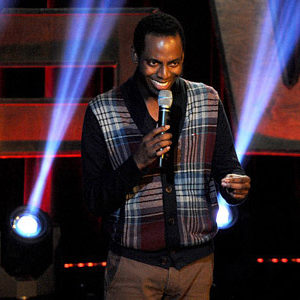MARC MARON is sitting on stage in a crowded Wilbur Theatre in Boston, hosting a live version of his wildly popular podcast WTF with Marc Maron, and feeling, for someone who makes a living revealing painful personal flaws, strangely exposed.
“The worst memories in my life are in this town,” he cracks, explaining his discomfort.
The last time Maron was in Boston, he was a fresh-faced comic commuting from New York City to open for top-shelf comics like Jimmy Tingle and Tony V, both of whom share the stage with him this January night in 2012, in a performance whose crowd magnet is clearly Maron himself.
“When I started doing comedy around here,” says Maron (CAS’86), who lives in Los Angeles, “basically what you would do is you’d get about 25 minutes of material and then you get booked through an agency. And they’d give you a map and $75, and you’d travel anywhere from 25 to 500 [expletive] miles in your car to do a two-man show and open for one of these guys. That’s how I started doing comedy. I drove to Machias, Maine. Do you know where Machias, Maine, is?”

Maron’s garage, where he interviews guests for WTF, has been replicated as a set in a TV show based on the comedian’s life.
Maron’s days of struggling in gritty or far-flung venues are long gone. Since launching his twice-weekly podcast from his garage in 2009, he has become a Renaissance man in the comedy world, as well as something more interesting: a new media talk show host, whose searing candor attracts millions of listeners—2.5 million to 3 million downloads a month—figures that often make him number one on the iTunes comedy chart. And starting the first week of May, he will play himself in a half-hour television series on the Independent Film Channel (IFC).
Maron’s online venture is remarkable in another way: it makes real money. Every episode is sponsored, many by www.stamps.com or Comedy Central. Maron won’t say what he makes for an episode, but a February 2012 profile on www.PBS.org reported that it was as much as $15,000.
That’s success by any measure, but Maron expresses doubts that new media shows like WTF might do to TV talk shows what Amazon.com has done to brick-and-mortar booksellers. “I don’t know about TV,” he says, “but terrestrial radio is certainly taking a hit. Podcasting is still a new thing, and there are still many more people not listening to podcasts than listening to them. We’ll see what happens.”
Last July, Maron released his 300th episode of WTF, a milestone in a parade of remarkably frank conversations with many of the biggest names in entertainment: writer-producer-director Judd Apatow and comedians such as Amy Poehler, Zach Galifianakis, Mindy Kaling, Ben Stiller, Ray Romano, Chris Rock, Jason Sudeikis, Robin Williams, Louis C.K., Sarah Silverman, Jimmy Fallon, Ed Helms, Garry Shandling, and Jonathan Winters. Maron is in some ways the Conan O’Brien of new media, and in fact the two have swapped roles, with O’Brien the interviewee on WTF and Maron often a guest on Conan.
Maron earned his success, says Rolling Stone writer Josh Eells, by being honest. “What makes the show so great isn’t just that Maron is smart, or funny, or smart about being funny,” Eells writes in a September 2012 profile. “It’s that after all his years of living that life—the touring, the drugging, the ex-wives, the failure—he’s reached a point of brutal self-candor that makes people open up to him in a way they never would otherwise. Almost every episode features a confession that’s either touching or surprising.”
In one WTF podcast, comedian Todd Glass came out of the closet. Other comics have talked about suicide attempts and their struggles with phobias. The confessions occasionally include some from Maron himself, who stumbled through two marriages and years of addiction to cocaine and alcohol before getting sober in 2000.
“In college you try to figure out How you fit in the world.”
“Sobriety changed my life,” Maron says. “It enabled me to accept myself for who I really am. It took a while. It’s been over 12 years now. I think the combination of staying sober and going through marriage, a bankruptcy, a career death, and divorce, which all culminated in creating the podcast, showed me something about myself and my ability to persevere and stick to who I am. I don’t think I would be alive if I didn’t get sober.”
Nick Zaino, who has covered comedy for the Boston Globe and maintains the Boston Comedy Blog, says Maron’s strength is that he doesn’t shy away from confrontation, pointing to the host’s talks with comedian Carlos Mencia, who’s been accused of stealing jokes. “He didn’t just say…‘I think Carlos Mencia is a thief,’ the way a lot of people might when those thoughts became zeitgeist,” says Zaino. Rather, Maron put the question directly to Mencia, giving him a chance to defend and explain himself.
The result, however awkward, is the kind of material that, according to Globe television critic Matthew Gilbert, sets Maron apart from other interviewers. “If you want to hear something real, unrehearsed, and largely nonpromotional from a star,” writes Gilbert, you aren’t going to find it on network television shows. “When Maron’s interviews get real…they can be transporting.”
Try Everything
Maron’s childhood took him from the New Jersey of his early years to Alaska, where his father was stationed in the Air Force, to Albuquerque, N.M., where he went to high school. Despite the distances traveled, he says, he always considered his roots to be in the Jewish communities of New York and New Jersey, where his comic sensibility was born. “When I was younger, most of the comics I identified with were Jewish,” he says. “Being Jewish and having a connection to New York and New Jersey helped my comedy, and I guess geographical distance from my roots broadened my mind.”
Maron, who arrived at BU in 1982, says the real source of the emotional discomfort he sometimes feels in Boston is not the memory of his less-than-winning performances in his early days as a stand-up comic; it’s the angst he experienced trying to find his way through his college years.
“In college you try to figure out how you fit in the world,” he says. “That has never been easy for me. I didn’t have a plan. I’m not sure I do now.”
Interviewer Becomes Interviewee
In a recent appearance on TBS’ Conan, Marc Maron (CAS’86) talks about his girlfriend, his emotional baggage, and all those roosters on Kauai.
At BU his efforts to find himself took him in many directions. “I wrote plays, poetry, film reviews,” he says. “I acted in plays. I edited the literary journal Ex Libris one year. I had successful sex for the first time. And all of those things come with a struggle.” He also did stand-up comedy for the first time, at a BU talent night in 1983. A year later, he got up the nerve to try Boston’s venerable stand-up circuit—and failed. “I couldn’t hack it,” he says. “I eventually decided to put it away.”
After graduation, he headed to L.A. and worked as a doorman at the Comedy Store, then returned to Boston to give the city and his comedy another try. It worked: in 1988, he came in second in the WBCN Comedy Riot. “I started working the clubs,” he says. “But mostly I did the large circuit of one-nighters all over the New England region. I was driving hours into the country, to different states, to beach towns all over to perform at a bar or pub or bowling alley.”
Three years after the Comedy Riot made him a working comedian, Maron moved to New York, where he found himself stuck with weeknight gigs. On weekends, he would return to Boston to perform.
For the next decade, Maron bounced between coasts. He moved to San Francisco and then landed a gig hosting Short Attention Span Theater on Comedy Central in New York. “I was commuting to New York City every few days for six months,” he says. “When they renewed for another six months, I moved back to New York and was there until 2002, when I moved to L.A. There are some shattered relationships and marriages and bad decisions and recovery in that timeline, too.”

In June, Marc Maron will play himself in a half-hour television series on the Independent Film Channel.
Four years ago, he says, when he launched WTF from his garage, he had no expectations and his business model was foggy at best. “No one really knew how to make money with podcasting,” says Maron. “It’s really just becoming clearer now for some people. Our first hurdle was getting people to listen. We knew we had to use new media, so we had to learn all that. We used Facebook, Twitter, and iTunes, of course, and we partnered with our server on an app. All of that helped, but also just old-time booking and publicity through old media was huge in getting people to the new medium of podcasting. I appeared on talk shows and talked to the press a lot, and certain guests were pivotal. A piece in the New York Times was a game changer.”
That story, which ran in January 2011, claimed that WTF had “over the last year or so become a cult hit and a must-listen in show business and comedy circles.”
These days, Maron kicks things off on WTF with a short monologue, expounding on whatever random thoughts are running through his head, from current events to his anxiety after finding a growth in his mouth. “I don’t look at what I do as interviews as much as I consider them conversations among my peers,” he says. “I’ve become a good listener. That’s made a big difference. And also the medium of podcasting gives me complete freedom, so I have free-flowing conversations about anything that comes up. I don’t know exactly why what I do resonates in this format. I am honest, but the more I think about it, I’m just looking for authentic engagement, real conversation about real stuff. I have a deep emotional need to connect with people, and that comes across in this medium. When I do connect it’s exciting.”
Maron fully appreciates that from a production standpoint, podcasting frees him from several constraints that burden television talk shows. “I have no time limit,” he says. “I don’t have to have forward momentum to a commercial break, I don’t have to produce segments, I don’t have to worry about the laugh, I don’t have to wear makeup or a suit. I don’t really plan an interview as much as I emotionally and mentally prepare to have at least an hour-long conversation.”
Another advantage of podcasting, Zaino points out, is the affordable price of failure. “There were no risks when it started,” he says. “It was a bit of equipment and some time, basically. So he had time to build that, whereas if he had started this on TV and it didn’t catch on, he might have been canceled, and that would be that.”
Fellow comedian and WTF guest Myq Kaplan has a different take on Maron’s popularity. “Asking why Marc Maron has found so much success with WTF is the wrong question,” says Kaplan (GRS’06). “A better question is, why did it take 20 years and a new technological format for Maron to find the recognition he’s deserved for most of those years? Maron is, among other things, brilliant and sad, hilarious and angry, personal and driven, and the podcast has finally let so many people find him, people for whom any or all of those elements resonate.”
Next up, that which seems inevitable for personalities in all media, old and new: Maron the interpreter becomes Maron the interpreted. He has a book deal for a memoir, Attempting Normal, with Spiegel & Grau, and he recently finished shooting 10 episodes of Maron, the TV series for IFC.
“I’m excited,” he says. “I’ve been doing comedy more than half my life, and it’s great to have the opportunity to do TV. I really thought that was never going to happen for me. We’ll see if people dig it. I’m just grateful I got the shot.”
As for the garage that hatched the show famous for being real and unrehearsed, that’s been replicated as a set for the new show.


















































Just wowww
Why is it that we can’t look anywhere today without encountering obscenity and crudeness? My question isn’t based on a moral objection. There might be a time and place for curse words, but the pervasive use of the expression “WTF” makes even intelligent people sound ignorant. When people like Lenny Bruce used “WTF” or an equivalent, it had an impact. Today it’s used by everyone, including 6-year-olds, and it’s become a “norm.” Its trendy usage is akin to millions of young people dressing alike in the 60s in an effort to show the world that they were non-conformists.
The expression “WTF” is boring, tired, and unoriginal. It has no shock value, it sounds juvenile, and it and other curse words, when used frequently, make the users sound like they have no original thoughts in their heads. I’ve seen “WTF” used in comments left on YouTube for Christmas carol videos. That a university would post “WTF” on its main web page is even more ridiculous.
This guy is absolutely hilarious!
After reading this well-reported and well-written story, I immediately checked out WTF, got hooked, went premium, “kicked in shekels,” as Maron likes to say, and now listen at every free (and not so free) moment. There’s nothing else like it.
Eric Levin (SPC, now COM’71; managing editor of the late, lamented BU News, ’69-’71; one of the hosts of The Jazz Grotto on WBUR, ’68-’71)
Mr. Clark: In a sweeping piece like this that basically covers Maron’s career from 1986 to the present, why would you not mention hosting Air America’s morning show when the network launched in 2004? Seems to me that was a pretty major break in his career, no?
Probably for the same reason they didn’t mention Adam and Eve as a sponsor – they don’t want to offend people who might take offense.
The designation for Mr. Maron in this article as CAS’ 86 is factually inaccurate. In 1986, there was no school with the name “College of Arts and Sciences” (CAS) at Boston University. Mr. Maron attended the College of Liberal Arts (CLA). The “College of Liberal Arts” at Boston University opened in 1873 and remained as such until it was renamed in the mid 1990s. There were no “College of Arts and Sciences” (‘CAS’) diplomas issued until the mid 1990s. The use of the current school designations before they existed is retroactive revisionist history. The correct designation for Mr. Maron is (CLA’ 86).
Joel Krakow
Boston University College of Liberal Arts (CLA’ 73)
I’m not sure I understand the reason for the–as I read it–outrage (seriously, ‘retroactive revisionist history’ is the kind of language reserved for irate political bickering or commentary on hostile dictatorships). The name of the school within the University has changed.
They didn’t close the building and level it to rebuild another. They adjusted the name. You both went to what is now CAS.
We both went to what was then CLA. It wasn’t CAS at that point in BU’s history.
Right. And now it’s called CAS.
It’s CAS now. It was CLA then. The USA used to be the 13 colonies. BU used to be a Methodist seminary in Vermont.
Marc Maron is great regardless of what the school’s name was when he went there. I just hope that they aren’t bugging him for a lot of money now that he’s found success. I do wonder what kind of conversation he’d have with Dean Sapiro, though.
Maron is hilarious.
I kind of love those earbuds pulsing.